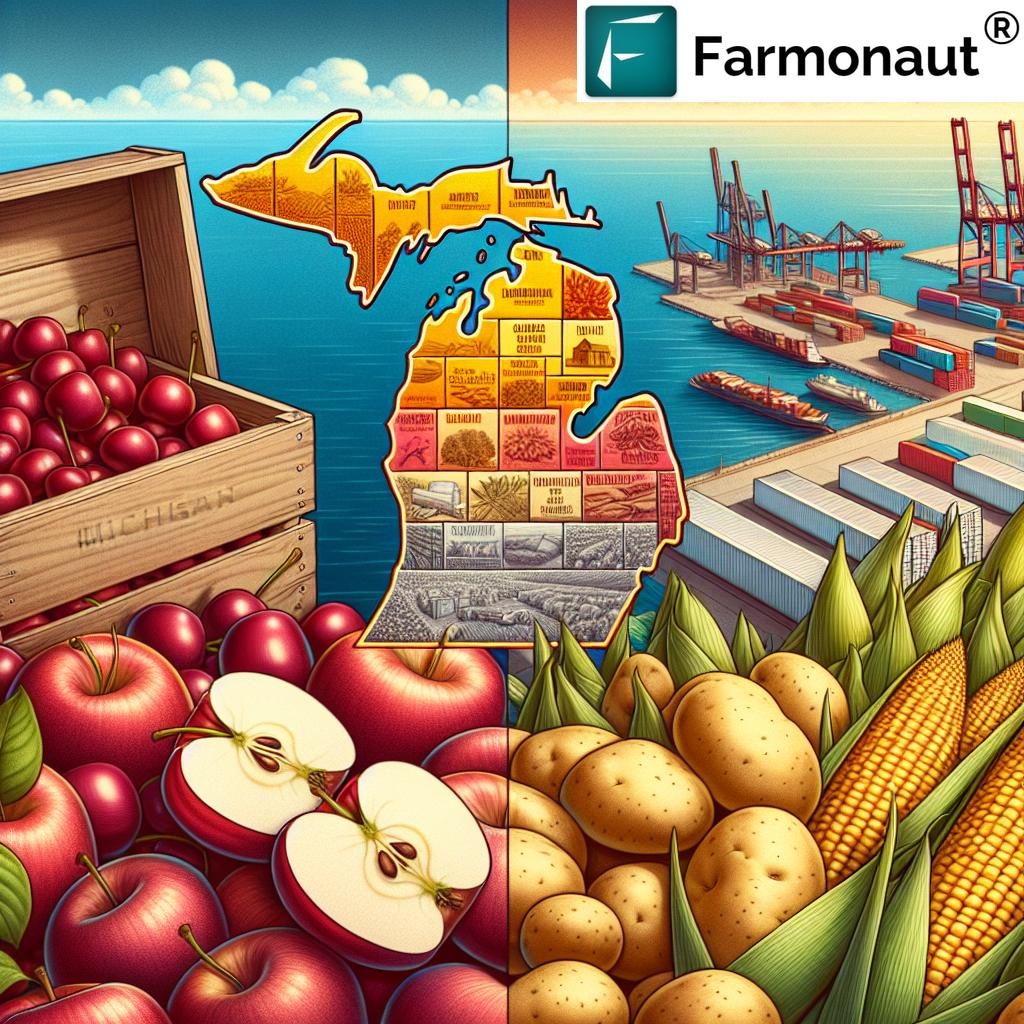Michigan Farmers Face Billion-Dollar Trade War Impact: Navigating Agricultural Challenges in a Shifting Economy
“Michigan’s $104.7 billion agriculture industry faces potential billion-dollar losses due to looming trade war threats.”
In the heart of America’s heartland, Michigan farmers are bracing for a storm that threatens to upend their livelihoods and reshape the state’s agricultural landscape. As we delve into the complexities of this looming crisis, we find ourselves at the crossroads of international trade relations and local economic realities. The potential trade war with Canada and Mexico casts a long shadow over Michigan’s thriving farming communities, putting at risk an industry that has long been the backbone of the state’s economy.
Our investigation into this pressing issue reveals a multifaceted challenge that touches every aspect of Michigan’s agricultural sector. From the sprawling soybean fields to the lush apple orchards, and from the dairy farms to the cherry groves, no corner of the state’s farming industry is immune to the potential fallout of escalating trade tensions.
The Looming Threat: Understanding the Trade War’s Potential Impact
As we examine the situation, it becomes clear that Michigan stands at a critical juncture. The state’s unique position as a powerhouse in both agriculture and manufacturing makes it particularly vulnerable to shifts in trade policy. Democratic U.S. Sen. Elissa Slotkin’s stark warning of “billions of dollars of loss” underscores the gravity of the situation facing Michigan’s farmers.
The potential reinstatement of tariffs on Canada and Mexico, scheduled for decision on April 2, hangs like a sword of Damocles over the state’s agricultural community. With Canada being Michigan’s largest agriculture market, the impact of these tariffs could be nothing short of devastating for many producers.

Let’s break down the key aspects of this unfolding scenario:
- Soybean Producers at Risk: Soybean farmers, in particular, have expressed grave concerns about their ability to stay in business if the tariffs are implemented.
- Wider Agricultural Impact: Beyond soybeans, Michigan’s diverse agricultural portfolio, including corn, dairy products, apples, asparagus, potatoes, and cherries, all face potential disruptions.
- Economic Ripple Effects: The $104.7 billion annual contribution of agriculture to Michigan’s economy underscores the far-reaching consequences of any significant downturn in this sector.
Michigan’s Agricultural Landscape: A Closer Look
To fully appreciate the stakes involved, we need to understand the rich tapestry of Michigan’s agricultural industry. The state’s farming sector is not just about economic numbers; it’s about communities, traditions, and a way of life that has defined Michigan for generations.
“As the most impacted state, Michigan’s unique farming-manufacturing combination makes it highly vulnerable to trade policy shifts.”
Michigan’s agricultural diversity is one of its greatest strengths, but in the face of trade uncertainties, it also presents a complex challenge. Let’s explore some of the key crops and sectors that could be affected:
Soybean Production: On the Front Lines
Soybeans have long been a cornerstone of Michigan’s agricultural exports. The potential tariffs pose an existential threat to many soybean producers, who rely heavily on international markets. The impact on this sector could be immediate and severe, with some farmers facing the prospect of going out of business entirely.
Corn: A Staple Under Stress
Michigan’s corn industry, another vital component of the state’s agricultural economy, faces its own set of challenges. While not as directly impacted as soybeans, the interconnected nature of agricultural markets means that disruptions in one sector can quickly spread to others.
Dairy Industry: Milking Uncertainty
The dairy industry, a significant contributor to Michigan’s agricultural output, is no stranger to market volatility. However, the potential trade war adds another layer of complexity to an already challenging landscape for dairy farmers.
Fruit Crops: Apples and Cherries in the Crosshairs
Michigan’s renowned fruit crops, particularly apples and cherries, are not immune to the trade war’s potential effects. These high-value crops depend on stable markets and could face significant hurdles if international trade relationships sour.
The Ripple Effect: Beyond the Farm
The impact of a trade war extends far beyond the boundaries of Michigan’s farms. We’re looking at a potential domino effect that could touch every aspect of the state’s economy and rural life:
- Rural Development at Risk: The economic health of Michigan’s rural communities is inextricably linked to the success of its agricultural sector.
- Job Losses: A downturn in agriculture could lead to significant job losses, not just on farms but in related industries and services.
- Supply Chain Disruptions: The interconnected nature of modern agriculture means that problems in one sector can quickly spread to others.
As we navigate these choppy waters, it’s crucial to consider innovative solutions and technologies that can help Michigan’s farmers weather the storm. This is where companies like Farmonaut come into play, offering cutting-edge tools to help farmers optimize their operations and make data-driven decisions.


Technological Solutions: A Ray of Hope
In these challenging times, technology offers a beacon of hope for Michigan’s farmers. Advanced agricultural technologies can help increase efficiency, reduce costs, and potentially mitigate some of the impacts of trade disruptions. Let’s explore some of these innovations:
Satellite-Based Crop Monitoring
Platforms like Farmonaut utilize satellite imagery to provide real-time insights into crop health, soil moisture levels, and other critical metrics. This technology allows farmers to make informed decisions about irrigation, fertilizer usage, and pest management, potentially optimizing yields and reducing resource wastage.
AI-Driven Advisory Systems
Artificial intelligence is revolutionizing farm management. AI systems can analyze vast amounts of data to provide personalized recommendations for crop management, helping farmers adapt to changing market conditions and environmental factors.
Blockchain for Supply Chain Transparency
In an era of trade uncertainty, blockchain technology offers a way to enhance transparency and traceability in agricultural supply chains. This can be particularly valuable for Michigan’s high-value crops like cherries and apples, helping to maintain consumer trust and potentially opening new market opportunities.
Economic Impact: A Closer Look at the Numbers
To fully grasp the potential consequences of the trade war on Michigan’s agriculture, let’s examine a detailed breakdown of the economic impact across key sectors:
| Agricultural Sector | Current Value (Estimated) | Potential Loss (Estimated) | Percentage Impact |
|---|---|---|---|
| Soybeans | $1.2 billion | $300 million | 25% |
| Corn | $1 billion | $150 million | 15% |
| Dairy | $1.5 billion | $225 million | 15% |
| Apples | $300 million | $60 million | 20% |
| Cherries | $100 million | $30 million | 30% |
This table illustrates the varying degrees of vulnerability across different agricultural sectors in Michigan. The potential losses, totaling nearly $800 million across just these five sectors, underscore the severity of the situation and the need for proactive measures to protect the state’s agricultural economy.
Navigating the Challenges: Strategies for Michigan Farmers
As we confront these daunting challenges, it’s crucial to explore strategies that can help Michigan’s farmers navigate this uncertain landscape. Here are some approaches that could prove valuable:
- Diversification: Expanding into new crops or markets can help spread risk and reduce dependence on any single product or export destination.
- Value-Added Products: Developing processed or specialty products can open new market opportunities and potentially increase profit margins.
- Embracing Technology: Investing in precision agriculture tools and data-driven farming practices can improve efficiency and resilience.
- Collaborative Efforts: Forming cooperatives or partnerships can help smaller farms pool resources and gain bargaining power.
- Exploring Alternative Markets: While traditional export markets may be disrupted, there could be opportunities in emerging markets or domestic value chains.

The Role of Policy and Support
While individual farmers can take steps to mitigate risks, the scale of the challenge calls for broader support and policy interventions. Some key areas to consider include:
Government Support Programs
Targeted assistance programs can help farmers weather short-term disruptions and invest in long-term resilience. This could include financial aid, crop insurance reforms, or support for adopting new technologies.
Trade Negotiations
Efforts to resolve trade disputes and secure favorable terms for Michigan’s agricultural exports are crucial. Policymakers must prioritize the interests of the state’s farming communities in international trade discussions.
Infrastructure Investment
Improving rural infrastructure, including transportation networks and broadband internet access, can enhance the competitiveness of Michigan’s agricultural sector and open new opportunities for farmers.
Looking to the Future: Innovation and Adaptation
As we navigate these challenging times, it’s clear that innovation and adaptation will be key to the future of Michigan’s agricultural sector. The integration of advanced technologies, such as those offered by Farmonaut, can play a crucial role in helping farmers optimize their operations and make data-driven decisions.
Farmonaut’s satellite-based farm management solutions, accessible via web and mobile apps, offer valuable tools for real-time crop monitoring, weather forecasting, and resource management. These technologies can help farmers increase efficiency, reduce costs, and potentially mitigate some of the impacts of trade disruptions.
For developers and businesses looking to integrate advanced agricultural data into their own systems, Farmonaut also offers API access to its satellite and weather data. This opens up possibilities for further innovation in the agritech space, potentially leading to new solutions that can benefit Michigan’s farmers.
Community Resilience and the Path Forward
As we conclude our exploration of this complex issue, it’s important to recognize the resilience and adaptability that have long characterized Michigan’s farming communities. While the challenges ahead are significant, they are not insurmountable.
By embracing innovation, fostering collaboration, and advocating for supportive policies, Michigan’s agricultural sector can navigate these turbulent waters and emerge stronger on the other side. The path forward will require creativity, determination, and a collective effort from farmers, policymakers, technologists, and communities across the state.
As we look to the future, let’s remember that the story of Michigan agriculture is one of perseverance and innovation. With the right strategies and support, Michigan’s farmers can continue to thrive, adapting to new realities and seizing opportunities in an ever-changing global marketplace.
FAQ: Michigan Agriculture and the Trade War Impact
- Q: How significant is agriculture to Michigan’s economy?
A: Agriculture contributes over $104.7 billion annually to Michigan’s economy, making it a crucial sector for the state. - Q: Which agricultural products are most at risk from the potential trade war?
A: Soybeans, corn, dairy products, apples, and cherries are among the most vulnerable sectors. - Q: How could tariffs on Canada and Mexico affect Michigan farmers?
A: These tariffs could severely impact exports, potentially leading to significant revenue losses and even putting some farmers out of business. - Q: What makes Michigan particularly vulnerable to trade policy shifts?
A: Michigan’s unique combination of strong agricultural and manufacturing sectors makes it especially sensitive to changes in international trade policies. - Q: How can technology help Michigan farmers navigate these challenges?
A: Advanced technologies like satellite-based crop monitoring, AI-driven advisory systems, and blockchain for supply chain transparency can help farmers optimize operations and adapt to changing market conditions.
Earn With Farmonaut: Earn 20% recurring commission with Farmonaut’s affiliate program by sharing your promo code and helping farmers save 10%. Onboard 10 Elite farmers monthly to earn a minimum of $148,000 annually—start now and grow your income!
Farmonaut Subscriptions
As we navigate these challenging times, tools like Farmonaut can provide valuable support to Michigan’s farmers. By leveraging advanced technologies and data-driven insights, we can work together to build a more resilient and sustainable agricultural future for the state.

For more information on how Farmonaut can support your farming operations, visit our API Developer Docs or download our mobile app today.




